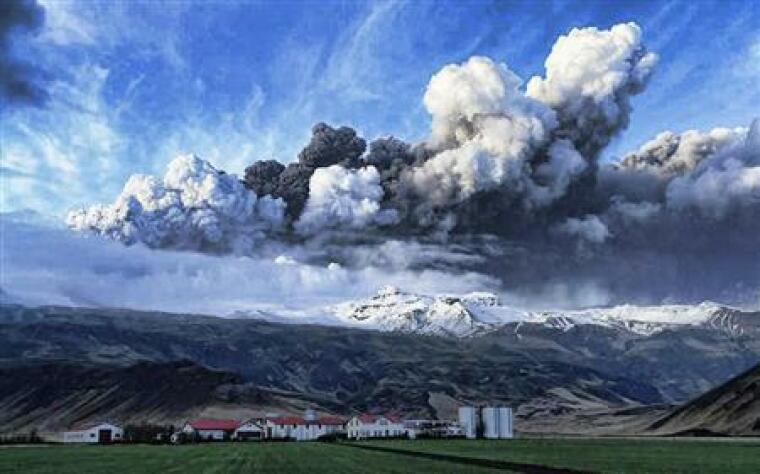Climate Change News 2015: Iceland's Crust Rising By 1.4 Inches Annually Due To Warming-Induced Ice Loss, Study Finds

The Earth's crust under Iceland is reportedly "rebounding" as the island's great ice caps melt due to global warming.
In a study made by a team from the University of Arizona, set to be published in an upcoming issue of Geophysical Research Letters, Icelandic land has been observed to be rising, with some sites moving up by as more than an inch a year, the Daily Mail reported
Scientists expressed concern over the rising of the crust due to warming-induced ice loss, saying this could increase the frequency of volcanic eruptions.
Researchers observed that the current rapid elevation of the crust is caused by the speedy melting of the island's glaciers. It also coincides with the onset of warming that started about 30 years ago.
Some sites in south-central Iceland have reportedly moved upward by as much as 1.4 inches per year, a speed that surprised the researchers.
"Our research makes the connection between recent accelerated uplift and the accelerated melting of the Icelandic ice caps," said the study's author, Kathleen Compton.
Geologists already know that the Earth rebounds as the weight of the ice decreases and glaciers melt and become lighter. However, they are not sure whether the current rebound is linked to the melting of glaciers in the past or to modern ice loss.
"Iceland is the first place we can say accelerated uplift means accelerated ice mass loss," said the study's co-author, Richard Bennett, an associate professor of geosciences from the University of Arizona.
To determine how fast the crust was moving upward, the researchers tracked the movement of the 62 global positioning satellite receivers fastened to rocks throughout Iceland and calculated how far they had traveled.
They observed that, at least for Iceland, the land's current accelerating uplift was directly related to the thinning of glaciers and to global warming.
"What we're observing is a climatically induced change in the Earth's surface," said Bennett.
Geological evidence showed that during the past deglaciation around 12,000 years ago, volcanic activity in some regions of Iceland increased thirty-fold, the Daily Mail reported.
 Christians don't have to affirm transgenderism, but they can’t express that view at work: tribunal
Christians don't have to affirm transgenderism, but they can’t express that view at work: tribunal Archaeology discovery: Medieval Christian prayer beads found on Holy Island
Archaeology discovery: Medieval Christian prayer beads found on Holy Island Presbyterian Church in America votes to leave National Association of Evangelicals
Presbyterian Church in America votes to leave National Association of Evangelicals Over 50 killed in 'vile and satanic' attack at Nigerian church on Pentecost Sunday
Over 50 killed in 'vile and satanic' attack at Nigerian church on Pentecost Sunday Ukrainian Orthodox Church severs ties with Moscow over Patriarch Kirill's support for Putin's war
Ukrainian Orthodox Church severs ties with Moscow over Patriarch Kirill's support for Putin's war Islamic State kills 20 Nigerian Christians as revenge for US airstrike
Islamic State kills 20 Nigerian Christians as revenge for US airstrike Man who served 33 years in prison for murder leads inmates to Christ
Man who served 33 years in prison for murder leads inmates to Christ


 Nigerian student beaten to death, body burned over ‘blasphemous’ WhatsApp message
Nigerian student beaten to death, body burned over ‘blasphemous’ WhatsApp message 'A new low': World reacts after Hong Kong arrests 90-year-old Cardinal Joseph Zen
'A new low': World reacts after Hong Kong arrests 90-year-old Cardinal Joseph Zen Iran sentences Christian man to 10 years in prison for hosting house church worship gathering
Iran sentences Christian man to 10 years in prison for hosting house church worship gathering French Guyana: Pastor shot dead, church set on fire after meeting delegation of Evangelicals
French Guyana: Pastor shot dead, church set on fire after meeting delegation of Evangelicals ‘Talking Jesus’ report finds only 6% of UK adults identify as practicing Christians
‘Talking Jesus’ report finds only 6% of UK adults identify as practicing Christians Mission Eurasia ministry center blown up in Ukraine, hundreds of Bibles destroyed: 'God will provide'
Mission Eurasia ministry center blown up in Ukraine, hundreds of Bibles destroyed: 'God will provide' Church holds service for first time after ISIS desecrated it 8 years ago
Church holds service for first time after ISIS desecrated it 8 years ago Burger King apologizes for 'offensive campaign' using Jesus' words at the Last Supper
Burger King apologizes for 'offensive campaign' using Jesus' words at the Last Supper Uganda: Muslims abduct teacher, burn him inside mosque for praying in Christ’s name
Uganda: Muslims abduct teacher, burn him inside mosque for praying in Christ’s name